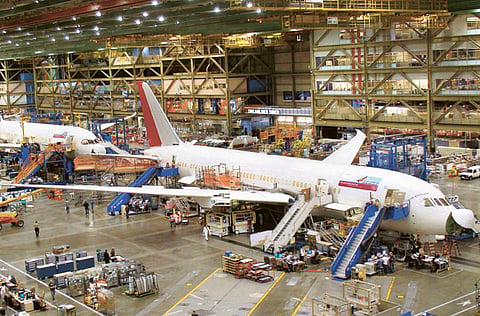Boeing expects robust growth in airline industry
Sector predicted to post $9b profit this year

Seattle: The worldwide airline industry is on a strong growth path again, according to an analysis plus forecast by plane manufacturer Boeing based on new figures by the International Air Transport Association (IATA). The analysis said that the sector will post a profit of $9 billion (Dh33 billion) this year after reaching a $15 billion surplus in 2010, a significant turnaround from the painful loss of $10 billion the sector experienced in 2009 when the global financial crisis hit the aviation industry.
"2010 was a year far better than expected, driven mainly by demand from emerging and developing countries," said Randy Tinseth, Vice President of Marketing at Boeing Commercial Airplanes. "And we expect that growth will continue in 2011, even though the rising fuel prices put some pressure on the airlines' profits."
New confidence
He said the new confidence in the business is underpinned by the fact that airlines are investing again, business travellers are returning and there is rising demand. Until 2013, global passenger traffic is expected to increase 6 per cent and cargo traffic may rise 6.5 per cent annually, based on the assumption that the world economy on a GDP basis will grow 3.5 to 4 per cent, Boeing's analysis said.
However, the fuel price is a thing that "has to be watched carefully," Tinseth said. As long as the oil price remains "relatively well behaved between $80 and $90" and the economy and sector yields continue to grow, "airlines can manage", he said. An oil price above that range would cause "some downward pressure", he added.
In its long-term outlook from 2010 to 2029, Boeing anticipates demand for 30,900 new aircraft at a market value of $3.6 trillion. Demand will originate mainly from China and South Asia, Tinseth said. Chinese airlines and low-cost carriers in the region will dominate the new purchases and "change the business mix in the sector," he said. In China alone, new plane demand in the period is estimated at 4,300 units.
In the Middle East, new aircraft deliveries and replacements will amount to 2,340 planes or 8 per cent of the total sector demand in the period, according to Boeing's forecast for 2029.
Other future challenges for the airline business will be environmental issues, mainly in terms of reducing carbon dioxide emissions and developing new "green" fuels.
"Although the airline industry only contributes between 2 and 3 per cent to the entire carbon dioxide emissions globally, there is room for improvement," says Richard Wynne, Boeing's director for Environment and Aviation Policy at Boeing Commercial Airplanes.
Reduce emissions
Thus, Boeing has introduced its ‘ecoDemonstrator' programme which is designed to reduce fuel emissions, noise and operating costs of aircraft using "green" technology and better air traffic management. With regard to green aviation technology, the UAE and some Gulf carriers have already taken action.
Abu Dhabi's Masdar is already working on an aviation biofuels project, and Etihad as well as Gulf Air are members of the Sustainable Aviation Fuel User Group.
Dreamliner delivery soon
Boeing's newest aircraft, the 787 series or Dreamliner, is set to be delivered to its first customer All Nippon Airways in the third quarter of this year, according to Scott Fancher, Boeing's vice-president of the 787 programme.
After the 787 series has been seriously delayed for about three years, now the last tests and certifications are being finalised, Fancher said. "The Dreamliner is flying quite well," he said. In a latest 24-day test flight programme in North and South America, the plane "performed beautifully," he added.
He admitted that Boeing had "some issues with quality from the supplier side last summer and fall," which caused the latest delay. Also, there are still certification procedures on the Rolls Royce engines ongoing.
Altogether, Boeing currently has 847 pre-orders for the new 787.
Boeing steps up 777 production
Boeing will increase production of its series 777 from 5 to 7 planes per month from summer 2011 and to an average of 8.3 planes per month or 100 per year by 2013 due to strong market demand, said Larry Loftis, Vice President of the 777 programme at Boeing Commercial Airplanes. "The 777 is the clear market leader in the 300 to 400 seats range and meets strong demand from the marketplace." Boeing will also make new investments in the production line and probably also into the extension of the range as suggested, among others, by Emirates, the biggest 777 customer.

![Pakistan Embassy and Consulate stress relying only on verified sources before travelling. [Illustrative image]](http://media.assettype.com/gulfnews%2Fimport%2F2024%2F01%2F11%2FStock-PIA_18cf721b120_large.jpg?w=320&auto=format%2Ccompress&fit=max)

